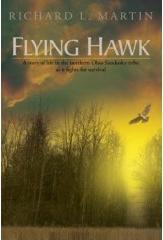Published April 2005
Floods have been a real problem in Ohio this winter, bad enough sometimes to destroy homes, strain dams, and send people scrambling for higher ground. Those floods are likely not over yet, since March and April with their frequent heavy rains can bring flooding again and again. We know what floods do to people, but just how destructive are they to wildlife? The answer varies according to the species involved.
Fish in lakes, for example, are effected little, if at all. They put up with muddy water for a few days that can inhibit feeding, but it makes little difference. In streams and rivers, life can be tougher because when waters creep over bottomlands, many species go with it and when they recede can be trapped in low spots, culverts, ditches, and temporary ponds. Back when I was a kid living near the Scioto River bottoms around Portsmouth, the Big Scioto flooded almost every spring (still does), and the vast bottoms between that city and the west side became a giant lake.
My uncle and I would slowly and silently wade those bottoms when it got down to ankle deep or less, with a No. 2 tub that had the bottom knocked out. I’d carry a burlap bag and he’d handle the tub, tossing it over rough species from carp to buffalo and suckers, and often enough, fill the bag. Other creatures got their share, and the remainder died to fertilize the bottoms for later corn and soybeans.
Snakes are a reptile that has little trouble with flooding. In the winter they hibernate and being cold blooded, drop into a near death sleep that sees their lungs and heart barely operating. Massasauga or swamp rattlesnakes found around places like Celeryville and Killdeer Plains have been submerged in water for weeks with no ill effects. Of course, later in the spring when they’re more active, floods will send snakes swimming for higher ground and many a Texan or Louisiana resident and Ohio too, living above a flood plain has awakened in the morning to find both poisonous and non-poisonous snakes crawling around their front yard.
Ohio’s upland game species, animals from whitetail deer to rabbits and woodchucks, have little problem with floods. All swim extremely well, and usually have no trouble reaching high ground. Deer, especially, have been seen swimming in Lake Erie heading from or to such distant places as Kelleys and South Bass Island. Most times, they make it. Even wild turkeys can swim, believe it or not, though they hate to do so.
Water animals have their ups and downs come flood time. Beaver don’t care one way or another, and river otters which feed mainly on fish can live for days with nothing to eat. But muskrats can be driven out of their dens and burrows by high water, and then become vulnerable to predation. River otters will eat them when their usual foods aren’t available, and mink don’t mind an occasional muskrat luncheon.
Some animals actually thrive come flood time with waterfowl being a good example. Ducks love to paddle around flooded cornfields and dabble for kernels well protected from any predation short of aerial, and geese have the same happy situation. Their only problem happens when a flood occurs during nesting season destroying eggs and necessitating a further session of nest building and egg laying.
And some plants almost depend on floods, using them for seed dispersal and to providing deposits of nutrient-rich sediments on the flood plain. Those same Scioto River bottoms mentioned before are extremely rich and require minimum fertilizer because, like the Nile, they’re flooded almost yearly. And creatures like moose couldn’t survive without floods. They depend on river willows growing on sandbars and stream bottoms for winter food, and without floods to scour the rivers, willows would soon be replaced by birch, cottonwood, and spruce.
Floods can be devastating anytime for humans, but it’s good to know that wild animals have learned to live with the problem and even thrive. Something to remember when April showers bring more than May flowers.
Tags: Flooding, Impacts of Flooding on Wildlife, Ohio Flooding, Swamp Rattlesnakes
